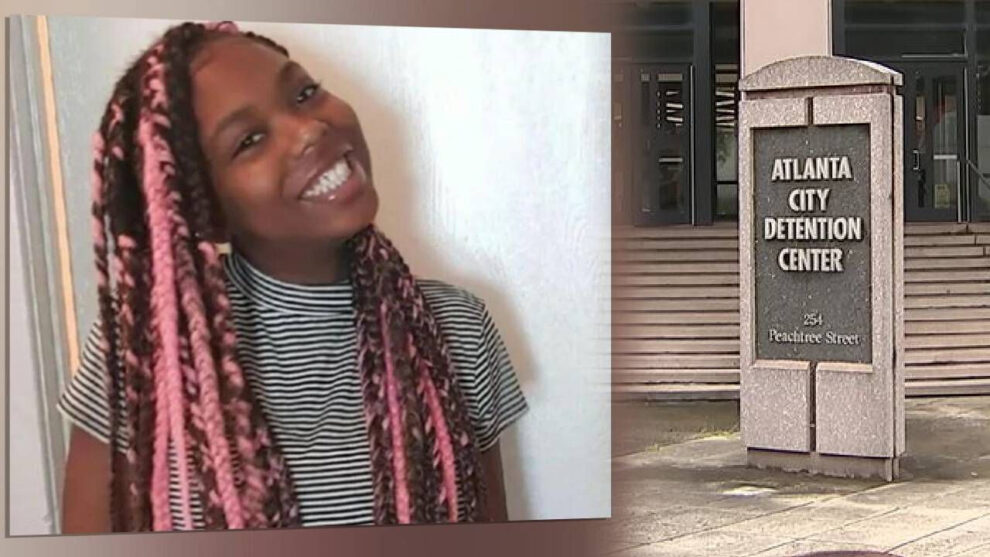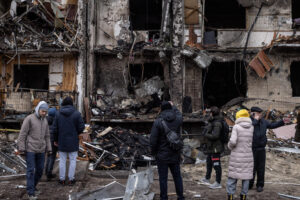Noni Battiste-Kosoko died days after her 19th birthday, amid a series of deaths in Fulton county custody.
Noni Battiste-Kosoko was found alone, face down and unresponsive in her cell at the Atlanta city detention center, managed by the Fulton county jail, on 11 July. Her death came just six days after her 19th birthday. The Fulton county sheriff’s office announced the death a day later, saying the teen had “no apparent signs of injuries”. Now, her family is demanding answers from Fulton county, which has found itself embroiled in a civil investigation after a series of deaths happened in its custody.
“Nobody knows what’s happening,” Shashu Battiste, Battiste-Kosoko’s mother, said. “I don’t understand why it’s taking so long to get this information.” County records show Battiste-Kosoko was arrested by the Fulton county schools police department on 16 February for “criminal trespass and damage to property” allegedly committed on 1 February at Langston Hughes high school. She was released 20 days later with a surety bond of $1,000. Then, on 20 May, two warrants were issued and executed for her arrest by the Union City police department for “failure to appear for finger-printable charge” and “fugitive from justice for finger-printable charge”. That last warrant was from prior charges from Miami-Dade county in Florida. The release date on both warrants is 11 July – the day she was found dead in her jail cell.
Sho Watson, Battiste-Kosoko’s family attorney, believes Battiste-Kosoko’s arrest stems from a minor infraction. “There was an incident that happened at one of the high schools here that led to the vandalism charge that she got,” Watson said. “We’re still not clear about the misdemeanor incident in Miami that precipitated the toll that kept her in the jail beyond the Fulton county matter.” Battiste-Kosoko spent 53 days behind bars (including 11 July) because she didn’t show up to court for the misdemeanor trespassing and vandalism charges. Watson and his firm, Edmond and Lindsay LLP, are still in their investigation’s fact-finding phase, impeded by lack of communication and information from Fulton county.
After she was found unresponsive, Battiste-Kosoko’s body was transferred to the Fulton county medical examiner for an autopsy later that evening. In a statement to the Guardian, Fulton county confirmed this and said authorities were still awaiting the report. The medical examiner’s office did not respond to comment requests before publication. “It’s frustrating to us because that’s all we know,” Watson said. “We know that the county performed an autopsy, and they are generally not required to release the results of the autopsy until, I believe, 90 days after its commencement. Do I think it takes them 90 days to do an autopsy? No.”
Following the teen’s death, the sheriff’s office also announced that the Atlanta police department would be investigating the case. The APD told the Guardian that while it was “assisting in the investigation”, Fulton county “remains the primary agency.” When asked for clarification, the Fulton county sheriff’s office rerouted the Guardian to the APD again for more details on the “criminal investigation”. Both agencies declined to provide the Guardian with any further details.
Before her death, Battiste-Kosoko’s family said, the teen struggled with some “challenges, not unlike most of us” and “had a history of mental health disease”. Her mother said when her daughter was younger, she had been diagnosed with psychosis. Her cellmate said she witnessed traces of this before Battiste-Kosoko’s death, saying the teen had been hearing voices in her head and felt jail officials ignored her condition. The cellmate once woke up to find Battiste-Kosoko banging her head against the concrete wall.
“It wasn’t like a soft bang,” the cellmate, who went by “Amanda” for her protection, told FOX 5 Atlanta. “It was a very solid, hard [bang], multiple times to the wall.” Court records state that the teen told officials that she had been unhoused in the months before her death after being released from a mental health facility. Atteeyah Hollie, attorney and deputy director of the Southern Center for Human Rights, isn’t surprised at another Fulton county incident. A long-time advocate for low-income and vulnerable Georgia residents in the criminal justice system, she said she was “left wondering how a 19-year-old woman with mental illness arrested on misdemeanors dies in Fulton county, just months after [35-year-old LaShawn] Thompson, another person of color living with mental illness and arrested for crimes of poverty, was found dead in Fulton’s main jail”. (Thompson was found dead with bedbugs and other insects on his body in his psychiatric wing cell in Fulton county jail in September.)
“When will we stop criminalizing poor people of color with mental illness?” she said. “When will we realize that jails do not make people better? What makes matters worse is that Miss Battiste-Kosoko’s passing wasn’t the last in-custody death at Fulton, what with the recent passing of Montay Stinson less than two weeks ago. Beyond the tragedy of people dying in state custody is the fear that these deaths have become normalized.” Also this month, another resident, 34-year-old Christopher Smith, was found unresponsive in a medical unit cell. Smith is the fifth person who has died in Fulton county custody this year.
On 13 July, two days after Battiste-Kosoko’s death, the US justice department’s civil rights division announced it had opened a civil investigation into the Fulton county jail. The investigation will look into the poor and unsanitary conditions of the jails themselves – which many advocates said led to Thompson’s death – and whether incarcerated people with “psychiatric disabilities” face particular discrimination. According to the assistant attorney general Kristen Clarke, the Fulton county sheriff has admitted that the main jail is “dilapidated and rapidly eroding” and that such conditions interfere with the ability to ensure basic safety for all people in the facility.
Hollie said this pattern of negligence and disrepair in the Fulton county jail had been pervasive and grave for low-income people of color, especially women and those with psychiatric disabilities. They often end up incarcerated due to behaviors stemming from their disability and financial struggles rather than criminal intent, she said. “We’ve seen women with serious mental illness arrested for proselytizing in a mall parking lot, refusing to leave a homeless shelter,” she said, “and other acts that were symptoms of mental illness and poverty, not signs of criminal behavior. But instead of connecting these women with the obvious services they needed, local law enforcement put these women in handcuffs.”
Hollie said the over-criminalization of mental illness and poverty had led to the Fulton county jail becoming a de facto mental health provider, despite its lack of appropriate resources and struggle with extreme overflow. At one point last year, about 500 residents were said to be sleeping on the floor – one of the city commissioners, Bob Ellis, referred to it then as a humanitarian crisis. “It almost seems like the worse the conditions and overcrowding get, the more bed space Fulton acquires – this is what happened with the South Fulton jail,” Hollie said, “where women like Miss Battiste-Kosoko were held before the move to ACDC [Atlanta city detention center] late last year. Fulton county leased beds in the South Fulton jail because people were sleeping on the floor in the main facility.”
Battiste-Kosoko’s family is left with many questions. While they wait for the autopsy findings, they want to know what exactly happened before her death. Where were the jail officials? Who was intended to watch her, when she was found dead and alone in her cell? How much time had elapsed While pressing Fulton county for answers, the family has set up a GoFundMe page to help with funeral and legal expenses. They’ve also sent a legal notice demanding $10m to Fulton county, citing potential negligence. “My only daughter, she was premature when she came into this world, and she left prematurely,” Battiste said. “My daughter wanted to go to college. She wanted to run track. She wanted to dance. She could sing. She could write. She was a wonderful friend. She was there for you if you needed her, and I need her now. And since she’s not here, I need answers to why my child is gone.”
Source : The Guardian











